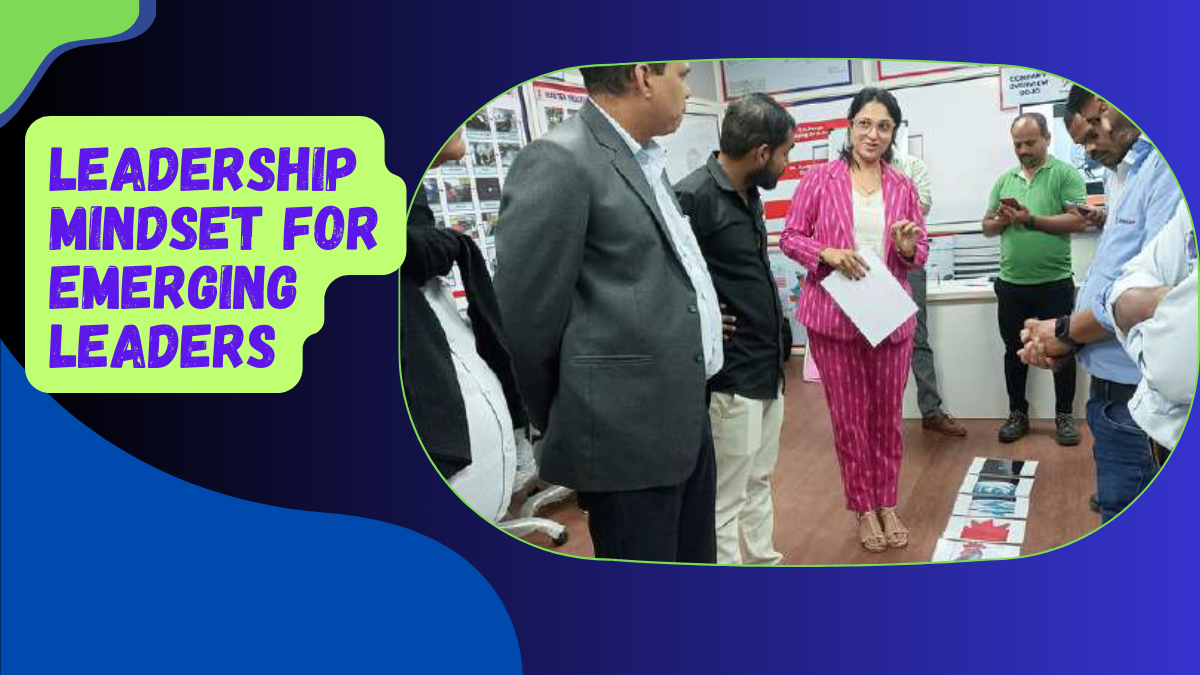
Leadership Mindset for Emerging Leaders
Leadership Mindset for Emerging Leaders: Building the Foundation for Success
Introduction
In today’s rapidly changing business environment, the demand for strong leaders has never been greater. Emerging leaders—those who are stepping into leadership roles for the first time—play a crucial role in shaping the future of their organizations. However, success as a leader is not only about mastering technical skills; it also requires cultivating a leadership mindset.
A leadership mindset involves adopting key attitudes, behaviors, and perspectives that enable individuals to inspire, motivate, and guide their teams toward achieving shared goals. This mindset is crucial for emerging leaders as they transition from individual contributors to those responsible for leading others.
In this article, we’ll explore the core elements of a leadership mindset, why it’s essential for emerging leaders, and how to develop the necessary qualities to lead with confidence and impact.
What is a Leadership Mindset?
A leadership mindset refers to a way of thinking and approaching challenges that aligns with the qualities of effective leadership. It is characterized by:
- A Growth-Oriented Perspective: Leaders with a growth mindset are open to learning, adapting, and growing from their experiences. They see challenges as opportunities for development.
- Visionary Thinking: Leadership requires the ability to think beyond the present and envision the future, setting clear goals and inspiring others to work toward them.
- Empathy and Emotional Intelligence: Successful leaders understand the emotions and motivations of others, creating meaningful connections with their teams.
- Accountability and Responsibility: A leadership mindset involves taking responsibility for decisions, successes, and failures, while also empowering others to do the same.
- Resilience: Leaders face many challenges and setbacks. The ability to remain focused and persistent in the face of adversity is key to maintaining long-term success.
Why Emerging Leaders Need a Leadership Mindset
For emerging leaders, the shift from being an individual contributor to a leader can be challenging. The skills that got them promoted may not necessarily be the ones that ensure their success as a leader. Adopting a leadership mindset early in their leadership journey is crucial for several reasons:
- Navigating Complexity: Leaders are responsible for managing complex relationships, decisions, and problems. A leadership mindset helps emerging leaders approach these challenges with clarity and confidence.
- Building Trust and Credibility: A leader’s mindset focuses on building trust, credibility, and respect. By modeling integrity and accountability, emerging leaders can inspire their teams.
- Fostering Collaboration: Leadership is about bringing people together and working toward a common goal. A leadership mindset helps emerging leaders create an environment where collaboration thrives.
- Inspiring Others: The ability to motivate and guide others is a hallmark of leadership. Emerging leaders who adopt a leadership mindset can inspire their teams through their actions, attitudes, and vision.
Strategies for Developing a Leadership Mindset
1. Adopt a Growth Mindset
Leaders who believe that they can continually grow and improve are more likely to be successful. A growth mindset helps emerging leaders remain open to feedback, embrace challenges, and learn from failures. Reading, taking courses, and seeking mentorship are all ways to foster a growth-oriented leadership mindset.
2. Develop Self-Awareness
Understanding your strengths, weaknesses, and emotional triggers is essential for leadership. Self-awareness allows leaders to manage their own behavior while understanding the impact they have on others. Regular self-reflection, assessments, and seeking feedback from peers or mentors can help emerging leaders become more self-aware.
3. Cultivate Emotional Intelligence
Leaders with high emotional intelligence are better equipped to handle interpersonal relationships judiciously and empathetically. Emotional intelligence helps leaders understand the emotions of their team members, fostering a supportive and collaborative environment. To cultivate emotional intelligence, emerging leaders should practice active listening, empathy, and emotional regulation.
4. Lead by Example
Emerging leaders should demonstrate the behaviors and attitudes they want to see in their teams. Leading by example sets a positive tone for the team and reinforces the values of accountability, integrity, and teamwork. When leaders model these qualities, their team members are more likely to follow suit.
5. Take Initiative
Leaders are proactive and take initiative rather than waiting for direction. Emerging leaders should seek out opportunities to solve problems, lead projects, or support others without being asked. Taking initiative not only demonstrates leadership potential but also helps in building confidence and competence.
6. Learn to Delegate
One of the biggest challenges for emerging leaders is learning to delegate effectively. A leadership mindset recognizes that delegation is key to team success and personal growth. Leaders must trust their team members, empowering them to take ownership of tasks while focusing on higher-level strategic decisions.
7. Focus on Long-Term Goals
While emerging leaders may be tempted to focus on immediate tasks, a leadership mindset involves thinking long-term. Successful leaders create a vision for the future and work strategically to achieve long-term goals. Developing strategic thinking skills and aligning daily tasks with larger objectives helps emerging leaders build sustainable success.
8. Build Resilience
Resilience is the ability to bounce back from setbacks and stay focused on goals despite adversity. Leaders face numerous challenges, and the ability to remain resilient is crucial for maintaining team morale and driving success. Emerging leaders should focus on developing mental and emotional resilience through self-care, mindfulness, and maintaining a positive attitude in difficult times.
Benefits of Adopting a Leadership Mindset
- Improved Decision-Making: Leaders with a strong mindset make decisions with greater confidence and clarity, considering both short-term and long-term impacts.
- Stronger Team Performance: A leadership mindset helps leaders inspire and empower their teams, resulting in higher productivity and morale.
- Personal Growth: Emerging leaders who adopt a leadership mindset experience greater personal and professional growth, positioning themselves for future leadership roles.
- Increased Adaptability: Leaders with a growth mindset are more adaptable to change, helping their teams navigate uncertainty and challenges.
FAQ: Leadership Mindset for Emerging Leaders
1. What is the most important aspect of a leadership mindset?
The most important aspect of a leadership mindset is a growth-oriented perspective. Leaders who are willing to learn, adapt, and grow from their experiences are more likely to be successful in their leadership journey.
2. How can emerging leaders develop emotional intelligence?
Emerging leaders can develop emotional intelligence by practicing active listening, being empathetic, and reflecting on their emotional responses. Emotional intelligence training, reading books on the subject, and seeking feedback from others can also help improve emotional intelligence.
3. Why is self-awareness important for leadership?
Self-awareness is crucial because it helps leaders understand how their actions, decisions, and behaviors impact others. By being aware of their strengths and areas for improvement, leaders can make more informed decisions and lead more effectively.
4. How can I transition from an individual contributor to a leader?
To transition from an individual contributor to a leader, focus on adopting a leadership mindset. This includes thinking strategically, delegating tasks, taking initiative, and focusing on developing your team. Building self-awareness and emotional intelligence will also help you transition smoothly into a leadership role.
5. What are some practical ways to build resilience as a leader?
Building resilience as a leader involves maintaining a positive outlook, practicing self-care, and learning from setbacks. Leaders can also build resilience by developing problem-solving skills, seeking support from mentors, and practicing mindfulness techniques to manage stress.
6. How can I inspire my team as an emerging leader?
Inspiring your team involves leading by example, communicating a clear vision, and empowering team members to take ownership of their work. By being empathetic, supportive, and encouraging, emerging leaders can inspire their teams to perform at their best.
Conclusion
Cultivating a leadership mindset is a critical step for emerging leaders on their journey to becoming effective, impactful leaders. By embracing a growth mindset, developing self-awareness, and fostering emotional intelligence, emerging leaders can build the foundation for long-term success. With the right mindset, they will be well-equipped to inspire their teams, navigate challenges, and drive organizational success.

Leave a Reply